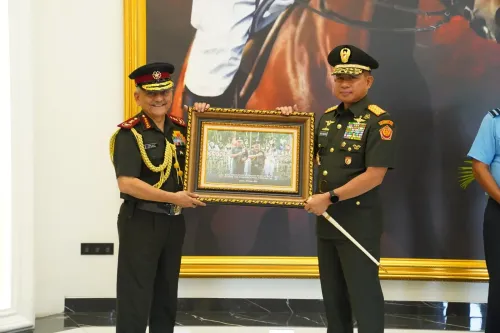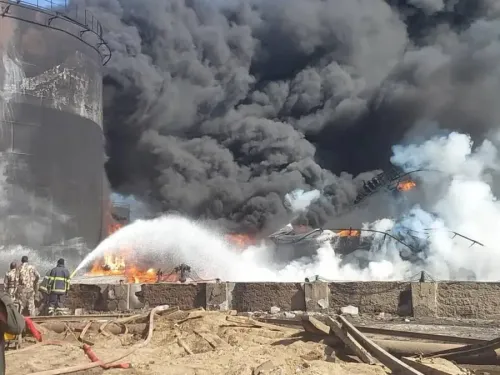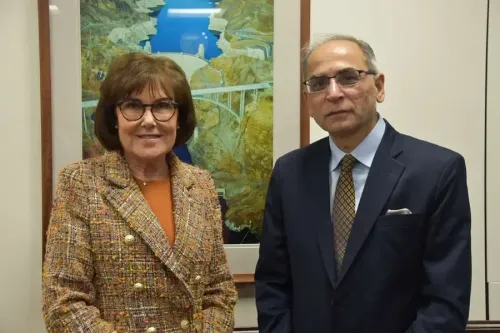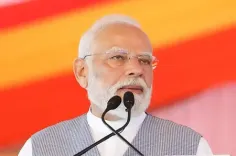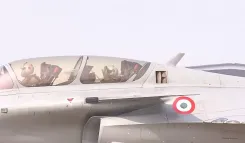Has Russia Supplied North Korea with Pantsir Air Defence Systems and Jammers Since Troop Deployment?
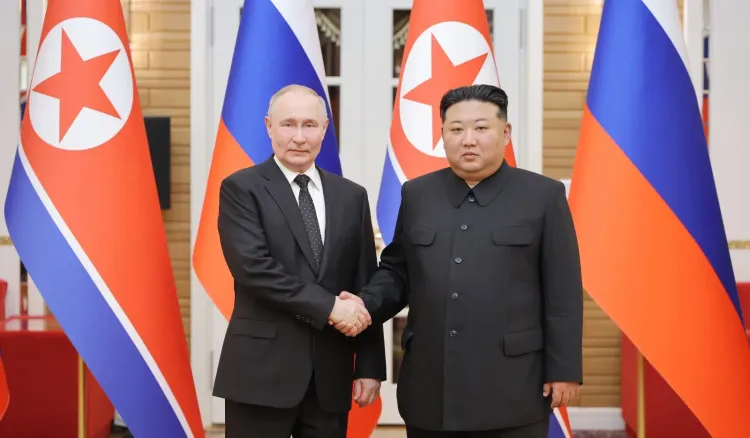
Synopsis
Key Takeaways
- Russia has provided military support to North Korea, including Pantsir systems.
- These actions violate UN sanctions designed to restrict military cooperation.
- North Korea has supplied Russia with a significant amount of military equipment.
- The two countries are strengthening ties through military exchanges.
- International monitoring efforts are ongoing to address these violations.
Seoul, May 29 (NationPress) Russia has supplied North Korea with its air defence systems, electronic warfare jamming technologies, and other military assistance since late last year, openly flouting UN sanctions amidst their strengthening relationship, as reported by an international monitoring report from Seoul's Foreign Ministry on Thursday.
Since November 2024, Moscow has delivered at least one Pantsir mobile air defence system and one Pantsir-class combat vehicle to Pyongyang, according to the Multilateral Sanctions Monitoring Team (MSMT) in their inaugural report on sanctions enforcement.
The MSMT was established in October last year, initiated by South Korea and the United States as an alternative to the UN Panel of Experts on North Korean sanctions monitoring.
This panel was disbanded in March of the same year because of a veto from Russia. Alongside South Korea and the US, nine other countries have joined this mechanism, including Australia, Britain, Canada, France, Germany, Italy, Japan, the Netherlands, and New Zealand.
This first report, specifically addressing the illicit military collaboration between Russia and North Korea, serves as the MSMT's initial evaluation of sanctions enforcement since its inception.
The findings relied on intelligence and data provided by the involved nations and private research institutes.
The Pantsir missile system comprises self-propelled, medium-range surface-to-air missiles and anti-aircraft artillery systems. A South Korean legislator recently noted that the weapons systems showcased on North Korea's new Choe Hyon destroyer closely resemble the Russian Pantsir system.
The report also indicated that North Korea has sent over 20,000 containers filled with military supplies to Russia since September 2023.
The shipments consist of approximately 9 million rounds of artillery and multiple rocket launcher ammunition, more than 100 ballistic missiles, over 200 heavy artillery pieces, alongside anti-tank guided missiles and rockets, as reported by Yonhap news agency.
These transfers are sufficient to equip three complete brigades, the report highlighted.
Russian transport aircraft were utilized for the arms transfers between November and December 2023, including three IL-76 and three AN-124 military planes from the Russian Transport Aviation Command, as stated in the report.
Furthermore, Russia has offered North Korea missile performance data and technical assistance to improve Pyongyang's missile guidance capabilities, blatantly violating UN Security Council (UNSC) resolutions against North Korea, which Russia itself endorsed as a permanent UNSC member.
The report indicated that North Korea dispatched over 11,000 troops to Russia in 2024, with an additional 3,000 soldiers sent recently. These troops received training from the Russian military on artillery drone countermeasures and basic infantry tactics.
The report noted that both nations have been engaged in high-level exchanges among senior military officials, signaling a deepening relationship following the signing of a bilateral defence treaty between Russian President Vladimir Putin and North Korean leader Kim Jong-un at their summit last June.
Russia provided North Korea with over 1 million barrels of fuel between March and October last year, which is significant given the UNSC sanctions limit North Korea's annual refined petroleum imports to 500,000 barrels.
Approximately 8,000 North Korean workers have been sent to Russia for employment in construction, IT, and other sectors, which also contravenes sanctions prohibiting the overseas hiring of North Korean workers.
The report further revealed that financial transactions between the two nations are being conducted through North Korean-owned bank accounts in rubles, established in South Ossetia, a Russia-backed autonomous region in Georgia.
The report is a result of efforts to bridge the monitoring gap that emerged after the disbandment of the UN panel, as stated in a joint declaration from the foreign ministry.
We reaffirm our commitment to fully implement relevant UN Security Council resolutions and continue monitoring their enforcement, the statement emphasized.

